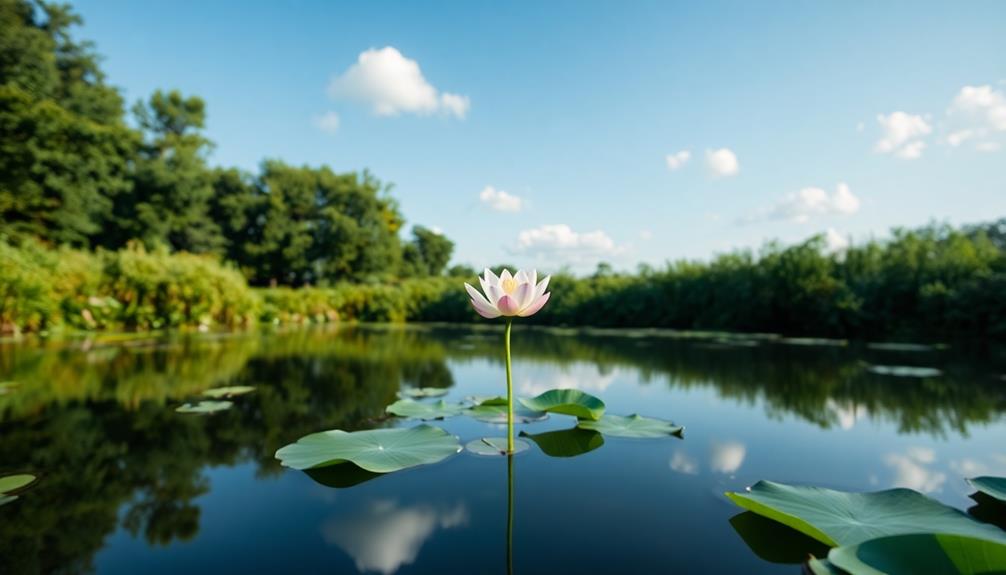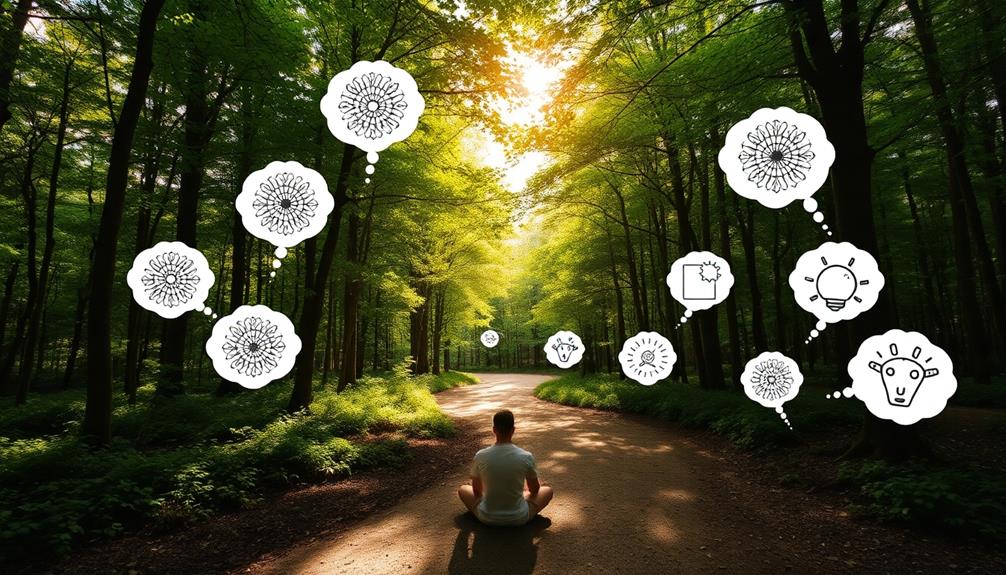Mindfulness and curiosity are essential for deepening your understanding of yourself and your surroundings. By practicing mindfulness, you become present, enhancing your emotional regulation and focus. This awareness fosters curiosity, allowing you to explore your thoughts and feelings without judgment. As you ask open-ended questions, you invite richer insights and improve your problem-solving skills. The combination leads to personal growth and deeper connections with others. Embracing these practices can cultivate resilience against stress and anxiety, transforming your experiences. Explore how this journey can enrich your life in ways you may not have considered before.
Key Takeaways
- Mindfulness enhances self-awareness and emotional regulation, which fosters a deeper understanding of thoughts and feelings.
- Cultivating curiosity through mindfulness encourages open-ended questioning, promoting problem-solving and continuous learning.
- Mindfulness practices, like breath awareness and body scans, improve focus and concentration, aiding in deeper exploration of personal experiences.
- Embracing a non-judgmental attitude enhances empathetic communication, leading to richer connections and understanding in relationships.
- Recognizing and challenging negative thought patterns through mindfulness promotes resilience and personal growth, facilitating a more fulfilling life.
The Essence of Mindfulness

Mindfulness is all about being fully present in the moment, and it can transform how you experience life. When you practice mindfulness, you're not just observing your thoughts and feelings; you're engaging with them in a non-judgmental way. This means you can better understand your mental patterns without getting attached to them.
By focusing on the present moment, you enhance your self-awareness and emotional regulation, which helps reduce stress and anxiety. Incorporating aromatherapy techniques can further deepen your mindfulness practice by promoting relaxation and enhancing emotional well-being. Techniques like breath focus and body scans are practical ways to cultivate mindfulness.
These practices lead to improved mental clarity and emotional well-being. You'll notice significant benefits, like better focus and enhanced sleep quality. Plus, regular mindfulness practice can alleviate symptoms of depression and anxiety.
Integrating mindfulness into your daily routine makes it accessible and impactful. Whether you take a few moments to breathe deeply or consciously engage with your surroundings, you can enhance your interactions and relationships through greater emotional awareness.
Embracing mindfulness opens the door to a richer, more fulfilling life, allowing you to experience each moment fully and authentically.
Cultivating Curiosity

To cultivate curiosity, you need to embrace a non-judgmental approach to exploration.
By fostering a mindset that encourages asking questions, you enhance your problem-solving abilities and promote continuous learning, which can lead to greater life satisfaction the benefits of curiosity.
Asking questions can serve as powerful learning tools, guiding you through your own experiences and emotions.
Embracing Non-Judgmental Exploration
In the journey of self-discovery, embracing non-judgmental exploration opens the door to a richer understanding of your thoughts and feelings. When you adopt a mindful approach, you learn to observe your experiences without criticism. This practice fosters a deeper connection with your inner self, allowing you to navigate your emotions with greater clarity and enhance your emotional intelligence, which is vital for personal growth.
Research shows that mindfulness enhances your curiosity, encouraging you to engage fully with the present moment. As you investigate your thoughts without judgment, you cultivate a sense of wonder that can spark creativity and innovative problem-solving skills. By letting go of preconceived notions, you not only appreciate experiences more fully but also build emotional resilience.
Embracing a non-judgmental attitude strengthens your relationships, too. When you communicate with empathy and openness, you become more receptive to the perspectives of others. This fosters deeper connections and enhances your understanding of those around you.
Questions as Learning Tools
Asking the right questions can spark your curiosity and lead you down a path of deeper understanding. When you engage in open-ended questioning, you foster a learning mindset that encourages exploration and inquiry. This process helps you better understand yourself and the world around you. Mindfulness plays an essential role here; being present while questioning allows for richer exploration of thoughts and feelings.
Here's a quick overview of how questions can enhance curiosity:
| Aspect | Benefits |
|---|---|
| Exploration | Encourages a deeper understanding of topics |
| Emotional Resilience | Helps manage stress and navigate challenges |
| Communication Skills | Promotes active listening and connection |
| Diverse Perspectives | Allows consideration of varying viewpoints |
| Mindfulness Integration | Amplifies curiosity through present-focused inquiry |
Nurturing Open-Minded Attitude
A genuinely open-minded attitude can transform your approach to learning and personal growth. By nurturing this mindset, you'll find it easier to suspend judgment and genuinely explore diverse perspectives and experiences. This openness enhances your curiosity, inviting you to ask questions and embrace uncertainty, which stimulates both intellectual growth and creativity.
Incorporating mindfulness practices, like meditation, can greatly boost your curiosity by anchoring you in the present moment. It helps you become more aware of your thoughts and feelings, fostering self-awareness and reducing self-judgment. As you engage in mindfulness, you'll notice that your emotional resilience grows, allowing you to navigate your feelings with greater compassion.
Moreover, an open-minded attitude promotes better communication and strengthens interpersonal relationships. When you actively listen and show genuine interest in others' viewpoints, you create a richer dialogue that expands your understanding.
Embracing this mindset not only enhances your learning but also makes you more adaptable to change and challenges. So, cultivate your curiosity and remain open to new experiences; it's a pathway to deeper understanding and personal growth.
Benefits of Mindfulness Practice

Mindfulness practice can greatly enhance your emotional regulation, helping you respond to life's challenges with greater calm and clarity.
You'll also notice improved focus and concentration, making it easier to tackle tasks effectively.
Enhanced Emotional Regulation
Practicing mindfulness greatly enhances your ability to regulate emotions, leading to a more balanced life. By increasing your self-awareness, mindfulness helps you identify and understand your emotional triggers and responses in real-time. This heightened awareness allows you to respond thoughtfully rather than react impulsively during challenging situations.
Research shows that individuals who regularly practice mindfulness experience lower levels of anxiety and depression, resulting in improved emotional stability and resilience. Techniques like mindful breathing and body scans can reduce physiological stress responses, promoting a calmer state when facing emotional challenges.
Furthermore, studies indicate that mindfulness practice can lead to structural changes in the brain, particularly in areas related to emotional regulation, such as the prefrontal cortex and amygdala. This neurological shift supports your ability to cope with emotions more healthily and effectively.
Adopting a non-judgmental attitude toward your thoughts and feelings is another significant benefit of mindfulness. It facilitates healthier coping strategies and reduces impulsivity, enabling you to navigate emotionally charged situations with greater ease.
With consistent practice, you'll find yourself better equipped to handle life's ups and downs.
Improved Focus and Concentration
When you engage in mindfulness practice, you'll likely notice a significant boost in your focus and concentration. By training your mind to remain present, mindfulness reduces distractions and enhances cognitive performance. Research shows that regular mindfulness meditation can increase your attention span and working memory, which helps you complete tasks more efficiently.
Practicing mindfulness can cut mind-wandering by up to 50%, allowing you to concentrate better on the task at hand. Techniques like mindful breathing and body scans not only improve your ability to manage stress but also foster clearer thinking, contributing to improved focus. This means you can tackle challenges with a sharper mind and greater clarity.
Moreover, mindfulness has been linked to increased activation in brain areas responsible for attention control. This heightened activation results in a more sustained focus during challenging tasks, which is essential for both personal and professional success.
Ultimately, cultivating mindfulness is a powerful tool for enhancing your mental health and achieving improved focus, making it easier to navigate your daily life with intention and clarity.
Stress Reduction Techniques
Amid the chaos of daily life, finding effective stress reduction techniques can feel overwhelming. However, incorporating mindfulness practices can notably ease your stress levels. Studies show that regular practitioners experience up to a 30% reduction in stress-related symptoms. By engaging in mindfulness, you enhance your emotional regulation, allowing you to manage stress and anxiety more effectively in challenging situations.
Mindfulness meditation not only helps you cope but also improves your body's response to stress. It lowers cortisol levels, leading to a calmer state of mind. Additionally, practicing mindfulness boosts your focus and concentration, making it easier to tackle daily challenges without feeling overwhelmed.
Here's a quick look at how mindfulness can help reduce stress:
| Mindfulness Benefits | Impact on Stress |
|---|---|
| Lower cortisol levels | Reduces physical stress response |
| Improved emotional regulation | Enhances coping mechanisms |
| Better sleep quality | Promotes overall well-being |
Exploring Thought Patterns

Exploring your thought patterns can reveal how repetitive negative thinking often traps you in cycles of anxiety and distress. This low entropy thinking makes your thoughts predictable, leading to heightened feelings of anxiety and negative emotions.
You might notice that your self-talk is filled with harsh criticism, causing you to over-analyze situations excessively. This can worsen your emotional state and make it difficult to break free from these harmful cycles.
To better understand your thoughts and emotions, consider these strategies:
- Recognize physical sensations: Identify how emotions manifest in your body, like a knot in your stomach or shallow breathing.
- Observe thoughts as clouds: View your thoughts as fleeting, allowing you to detach from negativity and appreciate their impermanence.
- Practice self-awareness: Engaging in mindfulness increases your ability to identify thought patterns and their impact on your emotions.
- Challenge negative self-talk: Shift your perspective and replace harsh judgments with kinder, more constructive thoughts.
Techniques for Mindfulness

To practice mindfulness effectively, you can focus on techniques like breath awareness and body scans.
These methods help you tune into your sensations and emotions, fostering a sense of calm.
Loving-Kindness Meditation adds another layer by encouraging compassion for yourself and others, enriching your emotional well-being.
Breath Awareness Techniques
Breath awareness techniques offer a practical way to anchor yourself in the present moment, enhancing your mindfulness practice. By focusing on the natural rhythm of your breath, you can start clearing your mind and cultivate a sense of calm.
Here are some effective techniques to incorporate into your daily routine:
- Diaphragmatic Breathing: Engage in deep breathing exercises to activate your body's relaxation response, lowering stress levels.
- 4-7-8 Breathing Method: Inhale for 4 seconds, hold for 7 seconds, and exhale for 8 seconds. This pattern helps calm your mind and improve focus.
- Mindful Breathing: Dedicate a few minutes each day to simply observe your breath, enhancing emotional regulation and reducing anxiety.
- Breath Counting: Count your breaths up to ten and then start over. This technique reinforces concentration and clarity of thought.
Incorporating these breath awareness techniques into your life can greatly improve your mental clarity and emotional well-being.
Just a few minutes of mindful breathing can make a difference, helping you stay anchored and present throughout your day.
Body Scan Practice
Many people find that practicing a body scan can greatly enhance their mindfulness journey. This technique involves systematically focusing your awareness on different parts of your body, promoting relaxation and deepening the connection between your mind and body. As you engage in body scanning, you'll observe physical sensations without judgment, which helps you become more attuned to areas of tension and relaxation.
By regularly practicing body scans, you can improve your emotional regulation and reduce stress levels. You'll learn to identify discomfort and release physical tension effectively. Research shows that this practice can enhance overall well-being, leading to better sleep quality and alleviating symptoms of anxiety and depression.
Incorporating body scan practices into your daily routine is simple; just set aside 10-20 minutes. Find a comfortable position, close your eyes, and start directing your attention through your body, from your toes to the crown of your head.
Notice how each part feels, acknowledging any sensations or discomfort. Embracing this mindful awareness can transform your relationship with your body and foster a deeper understanding of yourself.
Loving-Kindness Meditation
Loving-Kindness Meditation (LKM) serves as a powerful tool for cultivating mindfulness and compassion in your life. By silently repeating phrases of goodwill, you foster a deep connection with yourself and others. You start with self-directed kindness, using affirmations like "May I be happy, may I be healthy." From there, you can extend these wishes to loved ones, acquaintances, and even those you find challenging.
Here are some key benefits of practicing LKM:
- Increased positive emotions: Regular practice enhances your overall emotional state.
- Improved emotional resilience: You develop a stronger ability to cope with stress and adversity.
- Enhanced empathy: Shifting your focus from personal distress to compassion allows for deeper connections.
- Better relationships: LKM promotes goodwill, improving your interactions with others.
Engaging in loving-kindness meditation not only boosts your emotional well-being but also helps create a more compassionate outlook on life.
As you cultivate these feelings, you'll find that your capacity for empathy and understanding flourishes, leading to richer, more fulfilling relationships.
Start integrating LKM into your routine, and watch as your world transforms.
Guided Meditation Approaches

How can guided meditation transform your mindfulness practice? Guided mindfulness meditation practices offer structured sessions that make it easier for you to establish a consistent routine.
If you're a beginner, these approaches can deepen your understanding of mindfulness principles in just 10-15 minutes, fitting seamlessly into your busy schedule.
By focusing on techniques like body scans and breath awareness, you'll enhance your mindfulness and cultivate greater awareness of your thoughts and feelings.
Engaging regularly with guided meditation not only benefits your emotional well-being but also helps reduce symptoms of anxiety and depression, supporting overall mental health.
The science of mindfulness shows that these practices improve emotional regulation, allowing you to respond to stressors more effectively.
Additionally, participating in guided meditation fosters a sense of community. You'll find shared experiences with others who are on similar journeys, enriching your practice and motivation.
As you immerse yourself in these sessions, you'll likely notice a shift in your overall outlook, leading to a more profound connection with yourself and your surroundings.
Embrace guided meditation as a powerful tool for enhancing your mindfulness journey.
Personal Growth Through Awareness

Awareness serves as a powerful catalyst for personal growth, enabling you to recognize and understand your thought patterns more clearly.
By engaging in mindfulness practices, you can explore your thoughts and emotions without judgment, fostering self-discovery and deeper self-awareness. This journey not only improves your emotional regulation but also enhances your resilience against stress.
Here are some key benefits of cultivating personal growth through awareness:
- Enhanced emotional regulation: Learn to navigate feelings effectively, leading to improved responses in challenging situations.
- Greater resilience: Build the strength to cope with stress and adversity, promoting a healthier mindset.
- Improved mental well-being: Experience reductions in anxiety and depression symptoms, contributing to overall life satisfaction.
- Curiosity-driven problem-solving: Embrace an open-minded approach that encourages innovative solutions and deeper connections with others.
Regular mindfulness practice helps you observe transient thoughts and feelings, promoting a healthier relationship with your internal experiences.
Community and Connection

Mindfulness practices create a vibrant community where individuals can share experiences and learn from one another. As you engage in mindfulness, you'll notice how it enhances your interpersonal relationships. By fostering empathy and understanding, mindfulness strengthens your social connections, making you feel more supported and less isolated.
Communities centered around mindfulness often provide essential support networks, greatly reducing feelings of loneliness. Participating in group meditations and discussions allows you to connect with others who share similar journeys. Collaborative mindfulness activities, like workshops and retreats, deepen your connection to both yourself and the community, enriching your sense of belonging.
Integrating curiosity into mindfulness encourages open dialogue, paving the way for exploration. This openness facilitates deeper connections and shared growth experiences among community members. When you approach mindfulness with curiosity, you not only learn about yourself but also discover valuable insights from others.
In this way, mindfulness becomes a catalyst for building a strong, interconnected community, where everyone contributes to a collective journey toward understanding and compassion.
Embrace the power of mindfulness to cultivate connections that nourish your spirit and enhance your life.
Intimacy in Meditation

In meditation, intimacy unfolds as you engage fully with your experiences, allowing a deep connection to the present moment. This practice invites you to pay attention without judgment, fostering a profound sense of acceptance.
By welcoming all your experiences, you cultivate emotional awareness and resilience. As you meditate, the distinctions between subject and object begin to dissolve. This holistic approach deepens your self-understanding, enabling you to explore your thoughts and feelings without barriers.
With repeated practice, you develop the ability to pause, relax, and become intimate with whatever arises.
Here are some key aspects of intimacy in meditation:
- Fearless Receptivity: Embrace all experiences, good or bad, enhancing emotional flexibility.
- Deepened Self-Understanding: Explore the nature of your thoughts and feelings.
- Enhanced Well-Being: Foster compassion for yourself and others, enriching interpersonal relationships.
- Emotional Resilience: Learn to navigate life's challenges with greater ease.
Resources for Continued Learning

Discovering new resources can greatly enhance your journey into mindfulness and curiosity. Start by exploring Mindful Magazine, which has relaunched with subscription tiers that offer guided meditations and the latest research updates. This resource can keep you informed and engaged in your mindfulness practice.
Apps like Waking Up are also invaluable. They provide structured daily meditations and beginner-friendly courses to help you develop a consistent practice. Engaging with community events and newsletters can further enrich your understanding, offering insights into the science of mindfulness and promoting personal growth.
Don't overlook literature either. Books by experienced authors like Anne Alexander can introduce you to diverse perspectives and techniques that deepen your practice.
Lastly, utilize online platforms that curate mindfulness content. These resources for continued learning can connect you with new practices, fostering a deeper understanding of both mindfulness and curiosity.
Frequently Asked Questions
What Is Curiosity in Mindfulness?
Curiosity in mindfulness means approaching your thoughts and feelings with an open, non-judgmental attitude.
It's about asking questions and exploring your internal experiences without criticism.
When you're curious, you can better understand your emotions and reactions, which enhances your emotional resilience.
This mindset allows you to embrace uncertainty and fosters a deeper connection with yourself and others.
What Are the Four T's of Mindfulness?
Imagine sailing a boat through a foggy sea. The Four T's of mindfulness are your compass.
First, you chart your "Thoughts," acknowledging the mental waves without judgment.
Then, you feel the "Feelings," allowing emotional tides to flow.
Next, you tune into "Body Sensations," noticing the pull of the current within you.
Finally, you observe your "Environment," connecting with the vast ocean around you.
Together, they guide you to navigate your inner and outer worlds.
What Are the 5 Levels of Mindfulness?
The five levels of mindfulness start with Awareness, where you recognize your thoughts and feelings without judgment.
Next is Attention, where you focus on specific experiences, like your breath.
The third level, Intention, encourages you to set a purpose for your practice.
Acceptance comes fourth, allowing you to embrace experiences as they are.
What Are the 5 Steps of Mindfulness?
Imagine juggling flaming torches while balancing on a tightrope—mindfulness is your safety net!
You'll start with Pause, reconnecting with your core.
Next, you Relax, letting go of all those pesky tensions.
Then, you Open your mind, embracing curiosity like a kid in a candy store.
After that, you'll Allow experiences to wash over you without resistance.
Conclusion
In embracing mindfulness and curiosity, you'll find a serendipitous journey unfolding within you. As you cultivate awareness, patterns of thought reveal themselves, intertwining with your personal growth. This harmonious dance not only deepens your understanding but also fosters connection with others on a similar path. The more you explore, the more you discover; mindfulness isn't just a practice—it's a gateway to a richer, more intimate experience of life. Keep learning and let curiosity guide your way.









